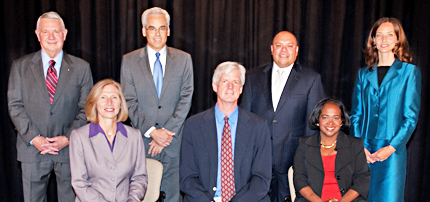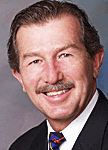An obscure 2006 ordinance gives policy makers same raise as the rank-and-file

The Austin City Council yesterday adopted an annual budget of some $3.5 billion for Fiscal Year 2014-2015, with Mayor Lee Leffingwell casting the only “no” vote.
Tucked inside was a hidden pay bump for these elected officials.
The current incumbents will enjoy the 3.5 percent pay raise for just a few months, starting October 1. The raise will mainly benefit the newly elected mayor and 10 council members who are scheduled to take office when inaugurated at 6pm Tuesday January 6, 2015, in Council Chambers.
The mayor’s annual salary goes from $79,601 to $82,387, an increase of $2,786, by The Austin Bulldog’s calculations (the City’s public information office was not able to obtain an official figure from the Human Resources Department in time for this story).
The council members’ salaries rise from $67,695 to $70,064, an increase of $2,369 (also our calculation).
There was no public notice of the raises.
The surreptitious pay raises for Austin City Council members are a gift that keeps on giving, thanks to a little known Ordinance No. 20061116-081 unanimously enacted November 16, 2006, when Will Wynn was mayor.
At that time, according to the closed-caption transcript of the meeting (see Item 81), council members had not had a raise since 2000. The terrorist attacks of September 11, 2001, resulted in slashing the City of Austin’s budget by some $125 million, cutting the workforce by nearly a thousand employees, and freezing pay raises, then Council Member Brewster McCracken stated during discussion of the ordinance. Over the ensuing years the City Council restored raises for rank-and-file employees and by November 2006 was ready to give itself a catch-up raise.
Which it did.
But the City Council also went one step further. The ordinance it passed also ensured automatic pay raises for the mayor and council equal to whatever percentage pay raise was granted to the bulk of the city’s employees when approving the annual budget.

Mayor Wynn justified the action, saying, according to the transcript, “… I trust people recognize that no elected official relishes the opportunity to vote for one’s own pay. That’s the situation we have found ourselves in over these years as has previous councils and I think council has taken an appropriate action this afternoon.”
It should be noted, however, that both Wynn and then Council Member Jennifer Kim declined to take the pay raises they voted for in 2006.
Leffingwell, Sheryl Cole and Mike Martinez, who were council members in 2006 and are still on the council (Leffingwell as mayor), all voted for the ordinance and accepted the raise, as did McCracken.

Attorney Bill Aleshire of Austin-based Riggs Aleshire & Ray PC, a former Travis County judge and Travis County tax assessor-collector, says of this behind-the-scenes way of getting pay raises should stop. He would be happy if the newly elected mayor and council members, who will approve city budgets in following years, would force the issue of raises for elected officials back into the sunshine.
“Anyone who believes in transparency should repeal that ordinance,” Aleshire said. “If they want a pay raise they should go on the record for it.
“I believe they should give themselves reasonable raises from time to time, but doing it through the stealth ordinance process just stinks.”
(Disclosure: Aleshire is the attorney of record for The Austin Bulldog’s two lawsuits against the City of Austin concerning violations of the Texas Public Information Act, one of which is pending in the Third Court of Appeals.)
No heat in the city’s kitchen
In the eight years that followed passage of the 2006 ordinance, and eight more council votes to approve an annual budget, including yesterday’s vote, the ordinance has indeed taken the heat off City Council members. They have not had to taste the “relish” that goes with publicly discussing their own pay increases.
County Commissioners Courts across the state have no such protection. They must stand up and be counted, and take the heat—if heat is to be felt—for raising their own pay.
County Commissioners Courts are regulated by Local Government Code Section 152.013, which requires newspaper publication of a notice of any salaries, expenses, or allowances that are proposed to be increased for all elected county or precinct officers—including the amount of proposed increases—more than 10 days before the commissioners court meets for a budget hearing and adopts the budget.
County commissioners must publicly vote on these pay increases. Then, each member of the commissioners court must personally sign the order setting salaries for elected officials, including their own.

County Attorney David Escamilla said the public notice requirement for the proposed salaries of elected county officials was enacted at a time when county commissioners courts were not authorized to raise their own pay; they had to go to the Legislature to get raises.
The public notice requirement is part of an appeals procedure, he said, whereby an elected official who wants to file a grievance over the proposed pay may do so.
In fact, the vote to set salaries for elected officials triggers “the statutorily mandated timeframes for filing and considering a salary grievance, if an elected official chooses to file one,” one such order states.
While the City of Austin’s methodology for keeping mayor and council salaries in line with the cost of living is opaque, it is nevertheless entirely legal, as permitted by Local Government Code Section 141.004, which states, “The governing body of a home-rule municipality may set the amount of compensation for each officer of the municipality.”
There is no requirement for the City of Austin to publish the proposed pay increases for the mayor and council, no requirement for the City Council to publicly vote on (or even mention) their pay raises, and no requirement for council members to individually sign a statement agreeing to the raises.
Other compensation
In addition to base salaries, the mayor and City Council members are entitled to draw an annual auto allowance of $5,400, a figure that has not changed since it was approved in 2006 via the same ordinance, and an annual cell phone allowance of $900.
Spelman is the only council member to accept the cell phone allowance, which is his only compensation.
Spelman is joined by Council Members Chris Riley and Kathie Tovo in declining to accept the $5,400 auto allowance.
Spelman the unpaid public servant
Council Member Bill Spelman is winding down his ninth year of service on the council and has never gotten a nickel of salary in all that time.
He was first elected in 1997 for a three-year term. At the time he ran for office he was not aware that as a University of Texas then-associate professor, and therefore a state employee, he would be prohibited from drawing a salary.
Section 40(b) of the Texas Constitution bars a state employee who is a member of a governing body from drawing a salary. Spelman chose not to run for reelection in 2000 but came back to run unopposed and win in 2009, then beat six opponents without a runoff in 2012.
Spelman’s surprise at being denied the $30,000 a year council salary authorized when first elected, was reported (by this journalist) in the In Fact newsletter November 19, 1997: “This is the most expensive hobby I’ve ever developed. Next time I’ll go buy a football team.”
Related Bulldog coverage:
Austin City Council’s Pay Raises Fly Under the Radar: County Commissioners Court raises require published notice, signed approval, July 22, 2011.







